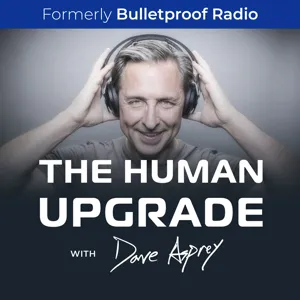Podcast Summary
Promoting Food as Medicine for Mental Health: Doctors Uma Nadeau and Michael Dixon's Food for Mood campaign aims to make nutritional psychiatry accessible to all through government, supermarkets, and medical practitioners, focusing on bringing fresh ingredients and changing the supermarket landscape.
The Food for Mood campaign, started around the king's dining table last year, is an exciting idea taking shape in the UK that promotes food as medicine to improve mental health. Doctors Uma Nadeau and Michael Dixon, who have a unique blend of expertise in psychiatry, cooking, and nutrition, are leading this campaign. They aim to engage multiple stakeholders including government, supermarkets, and medical practitioners to make nutritional psychiatry accessible to the masses. This campaign addresses the challenge of bringing fresh, nutrient-rich ingredients to everyone and changing the supermarket landscape. Listeners can look forward to more content on Doctor's Kitchen podcast, YouTube channel, seasonal Sundays newsletter, and the Doctor's Kitchen app for recipes and deep dives into ingredients and nutritional medicine.
Identifying the connection between food and mood: Understanding the gut-brain axis and its impact on mood, 90-95% of serotonin produced in the gut, focus on whole, nutrient-dense foods for mental and physical well-being.
During a conversation at a dining room table with the Prince of Wales and other guests, Umu, a psychiatrist, identified a desire to help everyday people eat healthier for both physical and mental well-being. This led to the Food for Mood campaign, which focuses on the gut-brain connection and the importance of understanding the impact of food on mood. The campaign aims to make this information simple and accessible to all. Key to this understanding is the gut-brain axis, which shows that our brain and gut originate from the same cells and remain connected throughout life. Ninety to ninety-five percent of serotonin, the happiness hormone, is produced in the gut, and the receptors for this neurotransmitter are also located there. This is why certain medications used to treat mental health conditions can have gastrointestinal side effects. To eat for mental well-being, it's essential to be aware of foods that can negatively impact mood. For example, refined sugars, such as those found in many yogurts and sugary drinks, can have detrimental effects. Additionally, artificial sweeteners, often used as alternatives, can disrupt the gut and may not be beneficial. By focusing on whole, nutrient-dense foods, individuals can support both their physical and mental health.
Dietary changes improve mental well-being by interacting with gut microbes: Eating more colorful fruits, vegetables, fermented foods, spices, and leafy greens, while reducing refined sugars, can significantly improve mental health by interacting with gut microbes to lower inflammation, which is linked to depression, anxiety, and cognitive disorders.
Making dietary changes can significantly improve mental well-being by interacting with gut microbes to lower inflammation. This is crucial as inflammation is linked to depression, anxiety, and cognitive disorders. Foods rich in polyphenols, such as colorful fruits and vegetables, fermented foods, and spices like turmeric, are particularly beneficial. Leafy greens, which are rich in folate, should also be included. The science behind these benefits is complex, but the solutions are simple: eat more of these foods and fewer refined sugars. As a practicing GP, I believe the first step is raising awareness among both clinicians and patients that diet should come before medication. Personal experience and research show that simple dietary changes can lead to weight loss and improved mental health. The challenge lies in implementing these changes consistently. To make a real impact at a population level, we need to focus on patient activation and empowerment, providing them with the knowledge and resources to make healthier choices.
Individual motivation and community support are key to addressing health issues: Focusing on individual motivation and community support can prevent 80% of diabetic patients from progressing to full-blown diabetes and reduce childhood obesity. With government support and collective effort from education, healthcare, and community organizations, we could save nearly 15 billion pounds in diabetes care costs in the UK.
Individual motivation and community support are key to addressing health issues, such as diabetes and obesity. Dr. David Unwin's success in preventing 80% of his diabetic patients from progressing to full-blown diabetes shows the potential impact of lifestyle changes. Finland's experience in reducing childhood obesity through community-wide efforts is another example. However, implementing such changes requires government support and a collective effort from various sectors, including education, healthcare, and community organizations. The potential benefits are significant, with diabetes care costing nearly 15 billion pounds in the UK alone. By focusing on prevention and lifestyle changes, we could make a substantial impact on public health and reduce the financial burden on healthcare systems.
Integrating Diet and Lifestyle Changes into Mental Health Treatment: Considering dietary interventions alongside prescriptions can be effective for mild to moderate mental health cases. Educating the public about food-mental health connection allows informed choices and preventative measures.
Integrating diet and lifestyle changes into mental health treatment can be as effective as medication for mild to moderate cases. The conversation emphasized the importance of considering dietary interventions alongside prescriptions, especially for conditions like depression. The speakers also discussed the potential for a campaign or program that educates the public about the connection between food and mental health, allowing individuals to make informed choices at the supermarket level. The ultimate goal is to promote preventative measures and improve overall well-being, reducing the need for antidepressants in many cases.
Bridging the gap between brain health and budget-friendly meals: Educate consumers and clinicians about healthy food choices, advocate for changes in schools and parliament, and focus on simple, budget-friendly recipes using whole foods.
Nutritional psychiatry and healthy eating principles, as part of the food for mood series, aim to bridge the gap between the importance of healthy food for brain health and the practicality of implementing it for families. This approach emphasizes simple, budget-friendly recipes using whole foods like vegetables and cost-effective sources of omega-3s, such as tinned fish. However, the challenge lies in the prevalence of ultra-processed foods in supermarkets and the marketing tactics that make them appear affordable. As clinicians, we can focus on educating both consumers and clinicians about making healthier choices, giving them the knowledge to make informed decisions about where to spend their money. Additionally, advocating for changes in schools and parliament can also contribute to making healthy food more accessible. Ultimately, empowering individuals with knowledge is a crucial step towards improving mental health through nutrition.
Addressing food access for the poorest: Through community approaches, collaboration between food producers, farmers, and retailers, and policy changes like taxation and ingredient reduction, we can improve food access for the poorest and promote healthier offerings.
There is a national issue of ensuring the poorest have access to the worst food, which needs to be addressed. This can be achieved through community approaches or by bringing together food producers, farmers, and retailers to discuss solutions. The current system is locked, making change difficult, and a shift in the "currency" or accounting for hidden costs such as social, environmental, and health impacts could lead to better farming practices and healthier food offerings. Transparency and accountability are key to addressing this issue, but it's challenging for governments to tackle it without public and clinical pressure. Solutions could include taxation on harmful processed foods, reduction of specific ingredients, and the introduction of guidelines. Ultimately, a change in funding systems and a collective will to prioritize health and wellbeing are necessary.
Making whole foods accessible and affordable: The healthcare system plans to integrate gardens, offer healthy food options, and make nutritional info available to make good food the norm, not a luxury.
In the next 5 to 10 years, the healthcare system aims to make whole foods more accessible and affordable for everyone. This vision includes integrating gardens into clinics, offering healthy food in canteens, and making nutritional information readily available to consumers. The ultimate goal is to make good food the norm, not a luxury. This can be achieved by making it cheaper and more mainstream. A key example of this shift in thinking comes from parents who have chosen to avoid processed foods for their children, opting instead for fruits and vegetables. The way we think about food and its value plays a significant role in this transformation. By encouraging a focus on healthy options, even in a supermarket setting, individuals and families can make informed choices that support their overall wellbeing. This is just the beginning of a larger movement towards making healthier choices easier and more accessible for all.
Making nutritious food accessible and affordable: Through budget-friendly options, culinary medicine education, community cooking classes, clinician involvement, and prescription programs, we can make healthy eating accessible and enjoyable for all.
Making nutritious food accessible and affordable, along with providing education on the importance of healthy eating, is crucial in addressing the food crisis and improving overall health. This can be achieved through various means, such as budget-friendly options, culinary medicine education, and community cooking classes. The involvement of clinicians and GP surgeries in promoting these initiatives can significantly impact individuals' health decisions and create a supportive community. Additionally, prescription programs that encourage the consumption of fruits and vegetables can have profound effects on people's wellbeing. Overall, a combined effort from various sectors is necessary to make these changes a reality and make healthy eating an attainable and enjoyable option for everyone.
Ensuring Accurate and Beneficial Health Information on Social Media: Social media trends and influencers can provide entertainment and encourage healthy habits, but it's crucial to verify their accuracy and ensure they're beneficial. Trusted sources like healthcare professionals and fact-checking websites can help navigate conflicting advice and promote evidence-based information.
While trends and influencers can provide entertainment and even encourage healthy habits, it's essential to ensure the information they're sharing is accurate and beneficial. Misinformation, such as adding sugar to water in the name of a "zero calorie water" trend, can confuse and harm people. It's crucial for trusted sources like healthcare professionals to provide sensible, evidence-based information to help navigate the sea of conflicting advice. Social media platforms, including TikTok, can be used as educational tools, but it's essential to fact-check and verify the sources of the information. Ultimately, it's up to each individual to seek out reliable and trustworthy sources to make informed decisions about their health.





